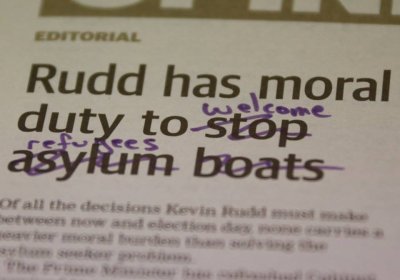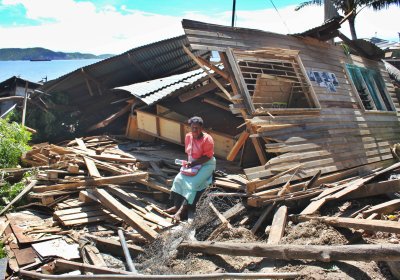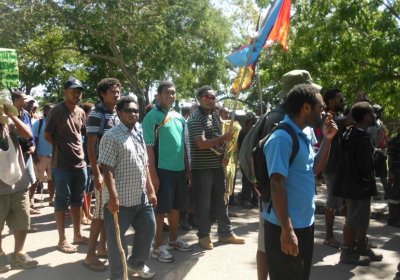Kevin Rudd's astounding announcement that all boat arrivals "from now on" would never be resettled in Australia, and subject to a jerry-rigged offshore dumping deal with the Papua New Guinea government has shocked many. Every asylum seeker that arrives by boat for at least the next 12 months would be sent to Papua New Guinea, with no cap on the number. In exchange, Australia would pump money into PNG's government for apparent health and education reforms.
Papua New Guinea
As asylum seekers face years of detention in the Nauru and Manus Island detention camps, where not a single claim has been assessed, the Australian government refuses to answer to scrutiny or calls for human rights oversight.
The ABC’s Four Corners and SBS’s Dateline have now tried to investigate the conditions inside each “regional processing centre”. The camps are believed to be abysmal, inadequate and places of widespread physical and psychological breakdown among detainees.
British-Australian mining giant Rio Tinto is seriously contemplating reopening its Bougainville copper and gold mine, Reuters reported on February 7.
Sydney's prestigious Hilton Hotel hosted the “PNG Chamber of Mines and Petroleum Investment Conference” over December 3-5. The event summed up the nature of the resource industry in PNG.
PNG Mine Watch said on December 1: “The Papua New Guinea Mining and Petroleum Conference in Sydney will be a room full of white men dicing and slicing PNG’s assets with little or no participation or informed consent from the people of Papua New Guinea.
The Papua New Guinean government has been forced to reconsider a deep-sea mining project off the PNG coast due to community concerns over environmental destruction.
About 24,000 people signed a petition against the Solwara 1 project in the Bismark Sea. The petition was handed to mining minister Byron Chan on October 23, said AAP. The project is run by Canadian company Nautilus Minerals and will mine for mostly copper and gold 1.6 kilometres under the seabed.
The International State Crime Initiative (ISCI) released a report on October 8 documenting a forced eviction that took place in Papua New Guinea’s capital, Port Moresby, on May 12. Residents of Paga Hill had their homes demolished en masse by the Royal Papua New Guinea Constabulary.
Papua New Guinea's new cabinet was named on August 10 by re-elected Prime Minister Peter O'Neill. It marked the end of the election period that ended the country's long-running political crisis.
The election period began in June and was extended in some areas due to violence, delays, fraud and voting problems.
The political crisis in Papua New Guinea (PNG) has reached farcical new depths before elections later this month.
Peter O'Neill was elected prime minister by parliament on May 30 for a third time since August. It was a bid to undermine a Supreme Court ruling on May 21 that again reinstated Sir Michael Somare as prime minister.
However, the vote may be illegal, since parliament had already been dissolved before the upcoming election, Reuters said that day.
Independent journalist and author Antony Loewenstein visited Papua New Guinea in January and February as part of his research for an upcoming book and documentary about disaster capitalism and privatisation.
He spoke to Green Left Weekly's Ash Pemberton about the influence of the resource industry in PNG, its links with government and private security forces, the rising influence of China and PNG's domestic politics in light of upcoming elections.
* * *
The controversial Ramu nickel mine near Madang in Papua New Guinea has come under fire for new claims of environmental damage.
The mine has been the subject of a long-running battle with locals over plans to pump 100 million tonnes of mine waste into Basamuk Bay over 20 years. The dumping threatens the pristine ecosystem of the area as well as the livelihoods of local people.
The presence of police and mobile brigade soldiers at construction sites for the PNG LNG (liquefied natural gas) project in Papua New Guinea ― majority owned by Exxon Mobil ― is an indication of the community discontent surrounding the project.
Fears have been raised that conflict over the project could provoke violence like that of Bougainville in the 1990s.
The crisis embroiling the government of Papua New Guinea has taken new turns as sections of the establishment struggle for power. Public outrage has grown against new laws that undermine the country's constitution.
Just days after pledging it would not use the new powers of the Judicial Conduct Act to suspend judges, the government of Prime Minister Peter O'Neill suspended Chief Justice Sir Salamo Injia and Justice Nicholas Kirriwom on April 4.
- Previous page
- Page 4
- Next page









